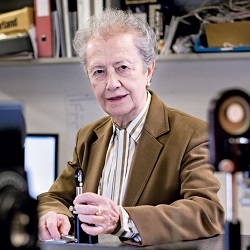March is Women's History Month, and we close out the month interviewing SPIE Fellow and Past President María Josefa Yzuel for our 'Why Light?' series. Emeritus Professor at the Autonomous University of Barcelona, Yzuel works tirelessly to promote women in science, serving as a leading member of the SPIE Women in Optics group. She took time to answer questions from our series that leads up to the first International Day of Light, and explains why she feels that light is so important.
The inaugural International Day of Light – IDL – will take place 16 May 2018. IDL is a global initiative that provides an annual focal point for the continued appreciation of light. This day recognizes light and the vital role it plays in science, culture and art, education, and sustainable development.
On 16 May, join SPIE and communities worldwide by participating in activities that illustrate how the science and art of light improves all our lives. For more information and to plan your own event, visit spie.org/IDL.
Meet SPIE Fellow María Josefa Yzuel,
Past SPIE President
Professor Emeritus, Universitat Autònoma de Barcelona
The inaugural International Day of Light – IDL – will take place 16 May 2018. IDL is a global initiative that provides an annual focal point for the continued appreciation of light. This day recognizes light and the vital role it plays in science, culture and art, education, and sustainable development.
On 16 May, join SPIE and communities worldwide by participating in activities that illustrate how the science and art of light improves all our lives. For more information and to plan your own event, visit spie.org/IDL.
Past SPIE President
Professor Emeritus, Universitat Autònoma de Barcelona



Comments
Post a Comment